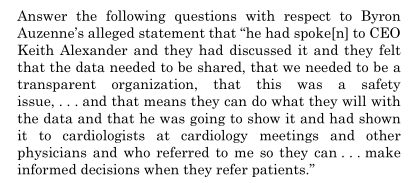The Dallas Morning News reported that the Fifth Court stayed the Rule 202 depositions of two UT-Southwestern executives in connection with its program for transgender use; the mandamus proceeding continues to be briefed in the meantime.
Monthly Archives: April 2022
In a defamation / business disparagement claim, when the charge told the jury to: it was reversible error for the jury to consider evidence about the effects of “a widespread ‘whisper campaign'” distinct from the referenced statement. Memorial Hermann Health System v. Gomez, No. 19-0872 (Tex. April 22, 2022).
it was reversible error for the jury to consider evidence about the effects of “a widespread ‘whisper campaign'” distinct from the referenced statement. Memorial Hermann Health System v. Gomez, No. 19-0872 (Tex. April 22, 2022).
After reviewing the several cases that find laches based on an unexplained four-month delay, In re Bottled Blonde Dallas LLC holds: “Here, relator waited more than seven months from the challenged order, and with only a month remaining before trial, to file this petition. Relator has offered no explanation for this lengthy delay. Accordingly, because we conclude that relator’s unexplained delay bars its right to mandamus relief, we deny mandamus relief.” No. 05-22-00353-CV (April 22, 2022) (mem. op.).
 Delaware corporate law has a robust line of authority about the advancement of attorneys’ fees during litigation; Texas, not so much, which is why In re Demattia is important to know. The case involved a typical advancement provision in an LLC’s organizational documents:
Delaware corporate law has a robust line of authority about the advancement of attorneys’ fees during litigation; Texas, not so much, which is why In re Demattia is important to know. The case involved a typical advancement provision in an LLC’s organizational documents:
“(a) the Company shall indemnify each Member who was, is, or is threatened to be made a party to any threatened, pending, or completed action, suit, or proceeding (‘Proceeding’), any appeal thereof, or any inquiry or investigation preliminary thereto, by reason of the fact that he or she is or was a Member ….”
in the context of the LLC’s suit against a former member for the alleged theft of trade secrets. Even in that setting where the member was adverse to the company, the Fifth Court held that the provision was enforceable, drawing on the principles established in Delaware law:
The board may well have a firm basis to believe that the official intentionally injured the corporation and is therefore reluctant to advance funds for his defense, fearing that the funds will never be paid back and resisting the idea of seeing further depletion of corporate resources at the instance of someone perceived to be a faithless fiduciary. But the Delaware courts have determined that to ‘give effect to this natural human reaction as public policy would be unwise’ because the possibility exists that the company’s allegations are untrue or cannot be proven.
Based on that conclusion, the Court granted mandamus relief as against a summary-judgment ruling adverse to the member on the issue of his entitlement to fee advancement. Notably, because of the limited scope of the order under review, the opinion addressed only the entitlement to fees, and not the specific procedural mechanism under Texas law for obtaining payment. No. 05-21-00460-CV (April 12, 2022).
- A summary judgment, granted on July 20, 2021, disposed of some but not all claims in the litigation;
- On July 29, the claims addressed by that summary judgment were severed into a new cause (thus creating a final judgment as to those matters);
- On August 30, 2021, the trial court’s plenary power expired in the new cause; and
- In October 2021, the trial court signed a final judgment in the new cause which was later appealed.
The Fifth Court dismissed for lack of jurisdiction: “[B]ecause the July summary judgment was made final by the severance and the trial court’s plenary power expired August 30, the October final judgment is void.” No. 05-22-00071-CV (April 18, 2022) (mem. op.).
In a (literal) footnote to Collins Asset Group v. Ayers, the Fifth Court noted a technical point about a line of attack on the relevant instrument: “Ayres also objected to the Note based on the absence of assignments, and on cross-examination, appeared to challenge the signatures on the Note. Ayres did not contest the authenticity of signatures in his verified denial, so the Note was admissible in that regard as fully proved. See Tex. R. Civ. P. 93(7); Boyd v. Diversified Fin. Sys., 1 S.W.3d 888, 891 (Tex. App.—Dallas 1991, no pet.).” No. 05-21-00295-CV (March 30, 2022) (mem. op.).
An eccleastical-immunity dispute led to the denial of mandamus relief in In re Munger Avenue Baptist Church, in which the Court reminded: “[W]here the petition for writ of mandamus challenges the trial court’s subject matter jurisdiction over the underlying proceeding, relators need not establish the lack of an adequate appellate remedy.” No. 05-21-00539-CV (April 13, 2022).
 A cautionary note on motions to extend the notice-of-appeal deadline: “[W]e have repeatedly held that delay caused by waiting for the trial court to rule on a post judgment motion or for the trial court’s plenary power to expire is unreasonable as it reflects an awareness of the deadline for filing a notice of appeal but a conscious decision to ignore it.” Ali v. Spectra Bank, No. 05-21-01113-CV (April 6, 2022) (mem. op.).
A cautionary note on motions to extend the notice-of-appeal deadline: “[W]e have repeatedly held that delay caused by waiting for the trial court to rule on a post judgment motion or for the trial court’s plenary power to expire is unreasonable as it reflects an awareness of the deadline for filing a notice of appeal but a conscious decision to ignore it.” Ali v. Spectra Bank, No. 05-21-01113-CV (April 6, 2022) (mem. op.).
In Sunchase IV Homeowners Assoc. v. Atkinson, the Texas Supreme Court returned to the topic of a defendant who wins a take-nothing judgment on a key claim, in the context of a Property Code fee-shifting provision, and reached substantially the same result as in the Court’s recent Rohrmoos opinion. No. 20-0682 (Tex. April 8, 2022).
Last Friday I spoke to the Dallas Area Paralegal Association about preparing a case for appeal in Texas state court. We covered, among other topics, the mechanics of preparing a notice of appeal (including the deadline!), ordering the clerk’s record, and ordering a reporter’s record that’s complete in all respects. Here is my PowerPoint.
In Southwest Airlines Pilots Union v. The Boeing Co., a dispute related to the 737 Max, the Fifth Court held: “[W]e conclude that SWAPA has standing to assert claims on its own behalf, but at the time the suit was filed, lacked standing to assert claims on behalf of its members. Although SWAPA’s subsequently acquired assignments of member interests do not cure the jurisdictional defects in the present case, the assignments might confer standing on SWAPA to file suit in the future. Thus, while the trial court properly dismissed the suit without providing SWAPA an opportunity to amend its pleadings, the dismissal should have been without prejudice. We further conclude that the RLA does not preempt SWAPA’s state law claims.” No. 05-20-01067-CV (March 30, 2022) (mem. op.). (LPHS represented the appellant in this case.)
Of general interest to court-watchers, building on a recent interview that I did with the Lincoln Project, the current episode of the “Coale Mind” podcast examines why today’s Supreme Court is like a bowl of soup, heated by two separate burners.
The first is the ongoing scrutiny over Justice Thomas’s recusal decisions in matters related to his wife’s political activity. The second, cool now but with the potential to become blazing hot, is the pending Dobbs case in which the Court could significantly limit or even overrule Roe v. Wade.
The combined heat potentially generated by these two issues–an ethical dispute about a Justice coupled with the possibility of a uniquely controversial ruling–could present a legitimacy problem for the Court of a magnitude not seen in recent memory.
 The panel majority in Texas Champps Americana v. Comerica Bank concluded that after a merger, Comerica owned the note sued upon, noting evidence about the handling of the note and its accounting, in the context of Tex. Bus. Orgs. Code § 10.008(a)(2) which provides: “[A]ll rights, title, and interests to all real estate and other property owned by each organization that is a party to the merger is allocated to and vested … in one or more of the surviving or new organization as provided in the plan of merger without … any transfer or assignment having occurred[.]” A dissent found inadequate proof without evidence tied to the actual plan of merger. No. 05-20-00461-CV (March 29, 2022).
The panel majority in Texas Champps Americana v. Comerica Bank concluded that after a merger, Comerica owned the note sued upon, noting evidence about the handling of the note and its accounting, in the context of Tex. Bus. Orgs. Code § 10.008(a)(2) which provides: “[A]ll rights, title, and interests to all real estate and other property owned by each organization that is a party to the merger is allocated to and vested … in one or more of the surviving or new organization as provided in the plan of merger without … any transfer or assignment having occurred[.]” A dissent found inadequate proof without evidence tied to the actual plan of merger. No. 05-20-00461-CV (March 29, 2022).
This testimony (in addition to, but also independently of, a business-records affidavit) was sufficient to prove up a note, and the Fifth Court found error in concluding otherwise, in Collins Asset Group v. Ayers:
Dan Laux, CAG’s Legal Outsourcing Manager, testified that he is familiar with CAG’s records and the method by which CAG acquires, stores, and takes possession of notes. He further described how this Note was received, scanned, and stored with CAG’s business records.
Laux testified that he received the original Note within thirty days of CAG’s purchase of the Note, and that he had tendered the original to counsel. He identified the Note attached to the business records affidavit as a true and correct copy of the original.
Laux also offered testimony about how CAG relied upon and used the Note to calculate the amount due and sent letters based on that calculation. Laux testified that CAG is the owner of the Note.
No. 05-21-00295-CV (March 30, 2022) (mem. op.).